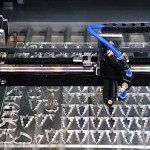In today’s rapidly evolving manufacturing industry, the quest for better efficiency, accuracy, and accountability is relentless. One of the most promising solutions emerging on this front is blockchain technology. Initially created to underpin digital currencies like Bitcoin, blockchain is now being recognized for its potential to revolutionize quality assurance processes in manufacturing.
“Blockchain has the potential to make manufacturing processes more transparent, secure, and automated, thereby ensuring higher quality standards,” says Maria Sanchez, a leading expert in industrial technologies. “It provides a tamper-proof ledger of transactions and processes that can be audited in real-time.”

Manufacturers are under increasing pressure to meet stringent quality standards while reducing costs. Blockchain can help by offering:
- Enhanced traceability: Every component or product can be tracked through its entire lifecycle.
- Improved transparency: All stakeholders have access to a single source of truth, reducing disputes and errors.
- Greater security: Data stored in the blockchain is immutable and encrypted, making it highly secure.
Quick Facts
- Blockchain can enhance traceability of products throughout the supply chain
- Blockchain provides a decentralized ledger that ensures data integrity and transparency
- Immutable records on blockchain prevent tampering and fraud
- Blockchain can reduce the need for intermediaries in quality assurance
- Enhanced data security on blockchain protects sensitive manufacturing information
- Blockchain technology can facilitate faster identification and resolution of quality issues
- Integration of IoT with blockchain can provide real-time monitoring of manufacturing processes
Key Challenges in Traditional QA Processes
A major issue in traditional QA processes is the presence of data silos within an organization. These silos create barriers to data sharing and collaboration, potentially leading to inconsistencies and inefficiencies in quality assurance across different departments (McKinsey, 2022). Furthermore, the susceptibility to fraud and manipulation is another significant challenge. Since data can be easily altered or fabricated, ensuring the integrity and authenticity of QA records can become a cumbersome task (Forbes, 2021).
Another critical problem is the difficulty in tracing products through complex supply chains, especially when various businesses employ different systems and protocols. This lack of interoperability can lead to gaps in the QA process, making it hard to track and verify the quality at every stage of the supply chain (SupplyChain 24/7, 2020).
The verification of data integrity remains a pain point. Traditional QA processes often rely heavily on manual procedures and documentation, making them susceptible to human error. As these records are not always tamper-proof, ensuring consistent quality control becomes quite challenging (Gartner, 2021). To tackle these issues, many organizations have started exploring innovative solutions, such as blockchain technology, to revolutionize their QA processes.

Quick Stats
- 30% of manufacturers have implemented or are planning to implement blockchain technology
- Blockchain can reduce quality control costs by up to 50%
- 70% of manufacturing errors are due to lack of transparency in the supply chain
- Blockchain can increase supply chain transparency by 60%
- Blockchain can reduce product recalls by 35%
- 80% of manufacturers believe blockchain can improve data security
- Blockchain implementation can lead to a 25% reduction in counterfeit goods
- Blockchain can improve compliance reporting efficiency by 40%
Why Quality Assurance Needs a Revamp
Modern manufacturing stands at a pivotal junction. Traditional quality assurance (QA) methods, while foundational, often fall short in addressing the multifaceted challenges that today’s industries face. These challenges include maintaining data integrity, preventing fraud, and ensuring seamless documentation, as highlighted by Quality Assurance Experts.
The room for error has diminished significantly. As Advanced QA Research indicates, legacy systems often struggle to adapt to these new demands, frequently leading to siloed data and ineffective verification processes. The result? Higher costs, inefficiencies, and a potential compromise in product quality.
It’s clear that a revamp is not just beneficial but essential. Embracing cutting-edge technologies, such as blockchain, could be the way forward. Blockchain’s inherent properties of transparency and immutability present opportunities to transform QA processes, ensuring data integrity and fostering trust among all stakeholders (Blockchain for Quality Assurance).
As professionals grow increasingly aware of the importance of up-to-date skills and methodologies, comprehensive training programs become crucial. Courses offered by QA Training Solutions empower both beginners and seasoned professionals to harness the latest tools and techniques, ensuring they are well-prepared to navigate the evolving landscape of quality assurance. Overall, rethinking and reenvisioning QA is not just about embracing new tools—it’s about laying the groundwork for future-proof manufacturing practices.
How Blockchain Enhances Traceability and Transparency
How does blockchain enhance traceability and transparency in the manufacturing industry. By implementing blockchain, companies can create an immutable ledger where every transaction and process step is recorded transparently and securely. This ledger allows for end-to-end traceability, crucial for identifying issues in the supply chain swiftly and efficiently.
With blockchain, each stakeholder, whether it’s the supplier, manufacturer, or distributor, can access accurate and reliable data. This level of transparency not only helps in identifying the exact point of failure in case of defects but also streamlines quality audits and compliance checks.
Consumers benefit immensely from blockchain technology. They can scan a product QR code to access detailed information about its origin, including raw materials used, manufacturing date, and compliance certifications. This level of transparency builds trust and brand loyalty, as consumers feel more confident in the quality and safety of the products they purchase.
The use of smart contracts automates various processes, ensuring that contractual obligations are met without the need for manual interventions. These contracts self-execute when predefined conditions are met, reducing the chances of human error and increasing operational efficiency.
By leveraging immutable records, manufacturing industries can significantly reduce fraud and counterfeiting. Each transaction is time-stamped and stored securely, ensuring that the data cannot be altered or deleted. This high level of security is crucial for safeguarding intellectual property and sensitive information.
Companies that adopt blockchain not only enhance their internal operations but also contribute to a more transparent and trustworthy market. This technology holds the potential to revolutionize the traditional quality assurance landscape, setting new standards for accuracy, efficiency, and consumer trust.
Case Studies: Blockchain in Action for Quality Assurance
These case studies highlight how companies are leveraging this technology to solve traditional problems and elevate their QA processes.
Case Study 1: Tracking Raw Material Quality
A leading automotive manufacturer faced challenges ensuring that the raw materials received from multiple suppliers met their stringent quality standards. Implementing a blockchain-based system allowed them to track materials from source to production. Each batch of raw materials was accompanied by a digital certificate stored on the blockchain, ensuring immutability and transparency. This enhanced traceability meant that any deviations or quality issues could be quickly identified and addressed, significantly reducing wastage and production delays.
Case Study 2: Ensuring Consistency in Production Processes
A food and beverage company applied blockchain to maintain consistency and quality across multiple production facilities worldwide. By recording each step of the production process on a blockchain ledger, the company ensured that every facility followed standardized procedures. Any anomalies detected during production were immediately recorded and flagged, allowing for real-time corrective actions. The result was a more consistent product quality and increased consumer trust.
Case Study 3: Warranty and Maintenance Tracking
In the electronics manufacturing industry, a company used blockchain to streamline warranty claims and maintenance records. Each product manufactured was assigned a unique digital identity stored on the blockchain, containing detailed records of quality inspections, warranty terms, and maintenance history. When customers needed warranty service, all relevant information was readily accessible, leading to faster and more efficient resolutions. This not only improved customer satisfaction but also provided valuable data for continuous quality improvements.
These case studies illustrate the practical benefits of blockchain technology in quality assurance. By offering unmatched traceability, transparency, and efficiency, blockchain can address many of the challenges that traditional QA systems grapple with, paving the way for a more robust and resilient manufacturing industry.
Overcoming Barriers to Blockchain Adoption
Adopting blockchain technology in the manufacturing industry comes with its own set of challenges. To overcome these barriers, it’s crucial to address several key areas:
Education and Awareness: A significant hurdle is the lack of understanding about how blockchain works and its potential benefits. This gap can be bridged by organizing workshops, training programs, and awareness campaigns that highlight real-world applications and success stories. Knowledge sharing among industry leaders can also play a pivotal role in demystifying blockchain.
Infrastructure Development: Blockchain adoption requires robust digital infrastructure. Manufacturers may need to invest in new hardware and software solutions, which can be costly and time-consuming. Partnering with technology providers and leveraging cloud-based blockchain solutions can help mitigate these challenges. Moreover, scalable infrastructure is critical to ensure that blockchain can handle the data volume typical of manufacturing processes.
Data Privacy and Compliance: Balancing transparency with data privacy is another barrier. Blockchain’s inherent transparency can conflict with regulations that mandate the protection of sensitive information. To address this, companies can adopt permissioned blockchains, which restrict data access to authorized parties only. Working with regulatory bodies to develop compliant blockchain solutions is also essential.
Financial Constraints: Implementing blockchain technology can be financially demanding, particularly for small and mid-sized manufacturers. To alleviate financial strain, companies can explore phased implementation strategies, start with pilot projects, and seek government grants or venture capital funding that supports technological innovation in manufacturing.
Scalability Issues: Blockchain networks must be capable of scaling to accommodate the extensive data generated in manufacturing processes. Continuous advancements and research in blockchain scalability, such as sharding and layer-two solutions, are essential to support widespread adoption. Collaborating with blockchain developers who specialize in scaling solutions can also offer a practical pathway to overcoming this challenge.
By addressing these barriers thoughtfully, manufacturers can unlock the transformative potential of blockchain technology in enhancing their quality assurance processes, leading to more secure, transparent, and efficient operations.


































